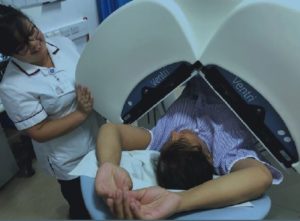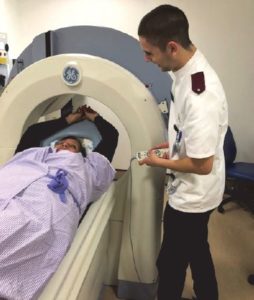Your nuclear medicine myocardial perfusion scan
Download and print as a PDF
Download- Before your scan: your checklist
- What is a myocardial perfusion scan?
- How do I prepare for my scan?
- Food
- Medications
- Clothing
- What if I need help?
- Transport
- Children
- Pregnancy or breastfeeding
- Pregnancy or breastfeeding
- What happens on the day?
- After your appointments
- Are there any risks?
- When will I get my results?
- Contact details
- Other information
Before your scan: your checklist
| Checklist |
Yes |
| Have you returned your yellow Medication and Allergy form? | |
| If asked, have you stopped certain medication? | |
| Have you made sure you have had no Caffeine for 24 hours before your scan? | |
| Have you eaten nothing for 4 hours before your scan? | |
| Have you brought some high-fat food with you? | |
| Are you wearing loose clothing? | |
This leaflet is designed to give you information about your Myocardial Perfusion scan. We hope it will be a helpful guide for you to use before your appointments.
What is a myocardial perfusion scan?
A Myocardial Perfusion scan is used to understand how well your cardiac heart muscle is being supplied with blood under stress(exercise) and rest.
The study is on two separate days and you will be in the department for approximately 2-3 hours on each day.
How do I prepare for my scan?
It is very important that you do not eat or drink anything containing caffeine, including decaffeinated drinks, 24 hours before your appointment. We can’t perform the test if you have.
Caffeine affects the medication used during the test. The following contain caffeine and so must be avoided for the 24 hours before your scan:
- No tea and coffee (this includes green tea and decaf varieties which can still contain small amounts of caffeine)
- No chocolate
- No colas and other fizzy drinks including energy or sports drinks
- Some cold and flu relief medications and some other medications (check the ingredients label).
We recommend you only drink water, milk, squash and fruit juice.
Food
Do not eat for 4 hours before your appointed time.
Please bring some food that has a high fat content with you on both days, for example: sandwiches such as sausage, egg or cheese. You will eat this as part of the study.
Medications
It is extremely important you complete and return the enclosed yellow form. Please list all medication that you are taking including over the counter drugs.
We cannot carry out your scan unless we know all the drugs you are taking.
Please continue to take your medication unless contacted. If you take any of the following:
- Dipyridamole (Persantin or Asasantin)
- Theophylline based drugs
- Sildenafil (Viagra)
- Tadafil (Cialis)
- Vardenafil (Levita)
- Avanafil (Spedra)
Please contact us on 01273 696955, extension 64381 or 64382.
Clothing
Please wear comfortable and loose clothing. Dresses are not suitable.
What if I need help?
Please contact us if you require additional or specific assistance. This includes help with communication (for example, interpreters), mobility, or a chaperone.
Transport
Please notify booking staff if you intend to book hospital transport as it will affect your appointment time.
Children
Avoid bringing children with you to the department. This is to avoid exposing them to unnecessary radiation.
After your study: If you have young children or pregnant friends/family please limit close contact with them for the rest of the day.
Pregnancy or breastfeeding
If there is a possibility that you are pregnant or you have not had a menstrual period within the last 28 days before the date of your appointment please inform the department before your appointment.
Pregnancy or breastfeeding
If there is a possibility that you are pregnant or you have not had a menstrual period within the last 28 days before the date of your appointment please inform the department before your appointment.
What happens on the day?
- Royal Sussex County Hospital, Brighton: please book in at the Nuclear Medicine reception in the Hanbury Building.
- Princess Royal Hospital, Haywards Heath: please book in at the Imaging reception.
A member of staff will come and collect you. The procedure will be explained to you and you will have an opportunity to ask questions.
A cannula will be placed in your arm or hand and you will be injected with a drug called Regadenoson. This will open up your blood vessels and increase the blood flow to the heart. This mimics the effect of exercise while you are lying on a bed.
This will be followed by a radioactive tracer (a substance with a small amount of radioactivity) that is put through the same cannula. This will allow us to take images of your heart muscle and see the blood flow to it.
Your heart rate, blood pressure and ECG are monitored throughout the study.
You may feel some side effects for a few minutes after the Regadenoson injection. The most common side effects are feeling out of breath, light headed, tired, headache, abdominal cramps and nausea.
You will have time to recover before we remove the monitoring and we will escort you back to the waiting area.
At this stage you will be able to have caffeine again. You will be asked to eat and drink (fluid restrictions permitting) before we take you for the scan. Eating is an important part of the study and you will have at least 30 minutes to do this. If possible, we encourage you to walk.
Scan
For the scan you will be asked to lie as still as possible on the scanning bed with your arms above your head, if you are able to do so. The technologist will be there to assist you and make you as comfortable as possible.
An ECG will be applied and a camera will be positioned close to your chest and move slowly around taking images.
A technologist will remain in the room with you. The scan takes approximately 20 minutes.

Occasionally people find that they feel tired or lethargic for the rest of the day. For this reason it is advisable to organise someone to take you home if possible.

Day 2: Rest test
Please return to the same Nuclear Medicine department.
No caffeine or food for 4 hours before your appointment. Please bring a sandwich.
You will be given an injection of a radioactive tracer. This will not cause you to feel any side effects.
You will have 45-60 minutes to eat and drink. Then we will carry out another scan. This will be performed in the same way as the scan on day 1.
After your appointments
Are there any risks?
Most side effects are mild and are usually over within 30 minutes. They can include hot flushes and feeling tired. They do not often require any treatment.
It is rare for patients to experience any serious side effects; however staff are trained to provide appropriate care should this happen.
The radioactive tracer injection exposes you to gamma rays which are a form of radiation similar to X-rays. We use as little radiation as possible.
The risks are very low and the benefits of having the results from the procedure greatly outweigh the risk.
When will I get my results?
The report will be sent to your referring doctor. They will contact you to discuss the results. If you have any enquiries regarding your results please contact the department where the referral was originally made.
If you fail to attend a booked appointment without telling us that you were unable to come, we will return the request to your referring clinician. A missed cardiac appointment costs the NHS £1500.
Contact details
Royal Sussex County Hospital (RSCH)
Nuclear Medicine Department
Hanbury Building
Eastern Road
Brighton
BN2 5BE
Telephone: 01273 696955, extension 64381 or 64382.
Other information
Please look on our website for more information leaflets about imaging procedures.
Patients Advice and Liaison Service (PALS):
Royal Sussex County Hospital: 01273 664511 or 01273 664973
Princess Royal Hospital: 01444 448678
This information is intended for patients receiving care in Brighton & Hove or Haywards Heath.
This information is for guidance purposes only and is in no way intended to replace professional clinical advice by a qualified practitioner.
Publication Date: January 2022
Review Date: October 2024


